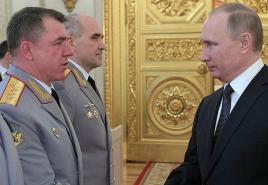Basic leadership qualities. What kind of successful leader is he?
Being able to be a leader is important for anyone who decides to start their own business or lead a company. For some, this skill is given by nature, and it manifests itself in childhood - at school, on sports fields, among peers. It is undoubtedly easier for such children to grow into real leaders in life. However, if nature has not fully endowed you with the qualities of a leader, this can always be corrected by hard work on yourself.
He is of the opinion that everything can always be developed in oneself, the main thing is to have great desire and perseverance. To know what to strive for, consider the qualities of a leader as formulated by John Maxwell (trainer for personal development, and in particular, leadership). In his opinion, every true leader must harmoniously combine 21 qualities, which will be discussed further.
Hardness
On the path of every person’s life, sometimes difficult situations arise, and in order to make a decision, you need to show your character. It is in such situations that the degree of strength of character and perseverance is revealed. A person who does not know how to show firmness in solving important issues and demonstrates inconstancy will never be followed by other people.
Charisma
Hundreds of books have been written on the topic of becoming a charismatic leader. This is a separate part of the general theory of leadership. And it’s not for nothing that psychologists pay such attention to this - developing charismatic qualities in yourself is not so easy if they are not given to you by nature. Difficult, but quite possible! The opinion that you either have charisma or you don’t, and nothing can be done about it, is wrong. Such people block their own achievements. Charisma is a personal attraction, and in order to develop it in yourself, you need to learn to love your life and people.
Devotion
To get people to follow you, you must be dedicated to what you do. Adequate love and commitment to one’s work are essential qualities of a leader. Your goal is to make people believe in your common cause, but how will you do this if you don’t believe yourself? Devotion can also be expressed in other, more “mundane” things: how much time you spend at work, what you sacrifice for it, and the amount of effort you put into achieving your goal.
Communication skills
You've probably noticed that the leader in every team is a sociable, talkative and easy-to-get-together person. This is not excessive talkativeness, but communication skills. If you want to become a leader, it is essential to develop the skills to communicate with a variety of people. If you have an idea or thought, but you cannot effectively convey it to others, how will they know about it? And then the fact that you have some unique idea will not matter to them at all.
In general, to develop your communication skills, it is important to adhere to following principles– don’t complicate your speech, notice people’s individuality, speak only sincerely and insist on a response.
Awareness
A knowledgeable or competent leader is not just a person who can convey his message to others, but can also develop a plan of action to solve problems; plan what he and those around him need to do. A competent leader does not need to convince people to follow him. When he becomes competent, people themselves want to follow him. Moreover, awareness is one of those qualities that needs to be proven constantly. Every day you must demonstrate this quality in communicating with your followers, and you should never stop at the level once achieved.
Courage
The courage that lives within a leader can engender this quality in his followers. When you are faced with a difficult situation that requires courage, boldness and bravery, you must first overcome the struggle with yourself. A courageous leader is one who makes not just quick and resourceful decisions, but also the right ones.
Foresight
With this quality you will be able to find a solution to the current problem and know without negative consequences in future. In order to choose the right path to solve a problem, it is necessary to find out the origins of its occurrence. After all, there is never just one solution; it is important to consider all alternatives.
Concentration
A leader's effectiveness is determined by his ability to focus on the task at hand. Here you need the correct prioritization. To achieve your goal most effectively, you need to know which things require more concentration and less. John Maxwell advises focusing on strengths by 70%, on weaknesses by 5%, and on new, not yet developed ones by 25%.
Generosity
Generosity is a powerful factor in persuasion and leadership. However, even here it is important to constantly stick to the same line and be generous always, and not just “on holidays.” Generosity shown only once is unlikely to give reason to consider you a truly magnanimous and generous person. A true leader who is able to captivate people must act in the interests of his group and each individual member, and not just his own.
Cultivating true generosity in yourself is not a quick process, however, when you succeed, you will notice how people themselves will begin to reach out to you. Of course, this is only possible in combination with the other leadership qualities we talk about in this article. Start with sincere gratitude for what you have, and perceive money not as an end, but as a means.
Initiative
To become successful, you need to take action. Moreover, to show not some abstract actions, but quite concrete ones. If you stop even for a short time, you already risk losing a lot of what you could have. Moving along a given path, of course, sometimes you will make mistakes, but the main thing is to never stop acting. Take the initiative to motivate yourself: don’t wait for external incentives, motivate yourself from within. It is also worth looking within yourself for the reason for the lack of initiative. For everything that is not as you would like, only you yourself are to blame, and not those around you.
The art of listening and hearing
John Maxwell called this quality art, since such a skill requires great job above oneself. A leader should always build his communication strategy so that followers do not talk to him about what the leader wants to hear. What is more important is what he really needs to know in a particular situation. If they only talk to you about pleasant things, praising your knowledge and skills, but are afraid (or do not want) to report troubles or admit their mistakes, then only the illusion of leadership is created.
To hear what your interlocutor (subordinate, partner, client, competitor) wanted to convey to you, during a conversation, open not only your ears, but also your heart. Perceiving only bare facts will not give you a chance to penetrate to the very essence of the problem. Learn to read between the lines and understand not only the words of your interlocutor, but also his feelings and emotions.
Passion
What can having passion do for a leader? Firstly, it fully develops the willpower of the individual. If you have a strong desire to achieve something, you will find the strength to do it, even if you have to sacrifice something. Secondly, passion enhances the ability to achieve the intended goal. Third, passion has the power to change the world around you. If you are guided by the passion you have developed for your goal, rather than by any other intentions or feelings, you will become a more effective leader.
Passion can erase the word “impossible” from your vocabulary - because if you passionately desire something, then nothing can stop you from achieving your goal.
Positive attitude
A person needs to periodically recharge with positivity. Good thoughts and attitudes are an important moment in your development as a successful person. This affects not only your own perception of the world and those around you, but also how people treat you.
On the path of each person there will be people who give him flowers and people who throw stones at him. It is important not to let these stones spoil your positive attitude in life. And the most experienced and effective leaders can even turn all the negativity directed towards them from ill-wishers into positive. Your attitude in life determines much that happens to you - from small things to great events.
Ability to overcome current difficulties
No matter what field you work in, sometimes you will be faced with difficulties that must be overcome. It is impossible to escape from problems; they have always been, are and will be in our lives. We are in constant development.
To develop problem-solving skills, rely on the following: analyze the current situation and make predictions possible difficulties; accept reality as it is; always consider the whole picture, and not its individual fragments; act in order, without skipping a single step; don't give up, even when something goes wrong.
Ability to get along with people
Each of us interacts with different people. And those who strive to become a leader must have a special attitude towards relationships with surrounding individuals. People will be drawn to you if they enjoy working with you; if you can get along with them in any situation, even the most uncomfortable ones. The ability to build favorable relationships with people is based on three factors: understanding, sympathy and desire to help.
Responsibility
It is important to remember once and for all: you alone are responsible for who you are, what you have and what you do. True leaders never shift responsibility to relatives, friends, colleagues, bosses, or subordinates. Great success is possible only if you have the ability to take responsibility and answer with dignity for your actions no matter the outcome of the situation.
Self confidence
If you have somehow taken a leadership position, but there are still traces of insecurity within you. As a leader, you will only harm your team, but most of all, yourself. In this situation, your internal personal shortcomings (uncertainty in your actions) will only intensify, since much is expected from you as a leader, but you will not be able to give it. A leader is a person who is able to instill confidence in other people; a leader who gives people more than he receives from them; a leader who empowers himself without neglecting others.
Self-control
Self-control is one of the foundations of success in achieving your goals. Without self-discipline, you will not be able to get the most out of your capabilities and reveal all your skills and talents. To develop self-control as a leader, you need to begin to lead a disciplined lifestyle, and it should concern not only work, but also all other areas. Forget about any excuses for your wrong actions, set priorities and strictly follow the plan.
Ability to work for others
It’s worth making a reservation right away: this is not about your position or work responsibilities, but about the psychological side of this skill. Paradoxically, to learn how to truly serve people, you need to have strong self-confidence. Only she can allow you to do this without compromising adequate self-esteem (which exists in every person). A leader who serves others does so at will, and puts people’s interests somewhat higher than his own.
Self improvement
A true leader will never be satisfied with what he has already achieved. Even when you have already gained respect from others, your opinion is valued and you can influence people, never stop improving yourself.
If you stop there, you can lose a lot of what you have already achieved. Why? The logical chain is simple: 1) the ability to improve yourself determines who you are; 2) who you are determines who and how you can lead; 3) and who you lead has a significant impact on the overall success of your team. To begin effective self-training, you need to get rid of excessive pride and narcissism, and admit that there is still a lot you don’t know and can’t do.
Work for the future
Without this quality, no person can become a leader. Those who want to get everything at once, as a rule, never gain anything. Look to the future, concentrate your efforts on the goal and you will definitely succeed!
Different cultural and historical eras, a set of political, economic, social conditions and standards of society imply the presence of leaders with different character qualities sufficient to solve pressing problems of the group, class, or organization. The demand for such people in our time is especially great, and, therefore, the supply is growing. From this follows the development of a struggle for the place of leader, which can only be occupied and retained by those who possess certain leadership qualities.
2. Passion. When a person is completely absorbed in an idea or work, everything else seems to not exist around him. Passion for what you do is an important character quality, because you can truly achieve success only by doing what you love.
3. Competence. The ability not only to verbally demonstrate your knowledge in a specific area, but also to confirm it with actions, and most importantly, with results, is worth a lot.
4. Long-term vision. People willingly follow only those who have not a momentary idea, but a global vision, a long-term plan for the implementation of their plans.
In turn, the English publicist Cyril Northcote Parkinson identifies the following elements of leadership that anyone can develop:
- Imagination. A leader must have a clear idea of what will happen as a result of his activities and what will happen at the end of the path he has taken.
- Knowledge. The stock of knowledge necessary to travel the road that the imagination draws.
- Talent. Every person is endowed with talent, you just need to realize what it is. Martin Roger, laureate Nobel Prize according to literature, he believed: “Talent without effort is like fireworks: it blinds for a moment, and then there is nothing left.”
- Determination. This is the quality that motivates a person to action, makes him work every day in order to achieve the desired result.
- Rigidity. Sometimes it is necessary to organize everything and make others work as the leader sees fit.
- Attraction. One of the main qualities of a leader’s character is the ability to be a magnet for people, attract them to oneself, and lead followers.
Leadership Development
Creating a leadership development program on your own is not an easy task, but it is quite possible. When setting such a goal, you must be as determined as possible to achieve your goals and clearly focus on practical steps. Determination and perseverance are important qualities of a leader.
The first thing you need to clearly understand is that it is impossible to become a leader in a day, a week, or a month. Based on this, you should set specific goals for yourself: from short-term (what you need to work on first) to long-term (how you see your life in a couple of years).
Exercise 2.1. The classic “Who am I?” exercise. Write down 10 answers to this question on a sheet of paper. Each answer must begin with the pronoun “I” and be specific. For example, this could be the entry “I am a student.”
After recording your answers, study them carefully. The goal at this stage is to identify what is preventing you from becoming a leader. If among the answers there are options like “I’m a bad friend” or “I’m a quiet person,” think about how you can correct the shortcomings and start working in this direction.
Exercise 2.2 A leader is distinguished by a clear understanding of the goals of his activities. Write down on a piece of paper entitled “My Goal” everything you would like to achieve as a result of developing yourself as a leader. These may be personal qualities that you think are missing or a desire to occupy a certain position at work. Be critical and don’t think too long; there will still be time to draw up a detailed plan.
As a result, you will receive material for initial analysis and establish what you should work on first. You will understand how you can become better, develop the missing qualities in yourself and begin to work daily on developing a leader in yourself.
Exercise 2.3. Celebrate your successes. Make it a habit at the end of each day to take a few minutes to write down on a piece of paper at least 3 things that worked best for you that day. You need to do this even if you had a really bad day.
This exercise will teach you to see the positive and celebrate it, and not highlight the negative, as most people do. Positive thinking is an important element of a leader's character. By focusing on the successful aspects of your work, you will also gain additional motivation.
Be a proactive person. Changing your life and changing yourself is in your power. In other words, the responsibility for what happens to you is entirely in your hands. Not happy with what you have now? Take action and change it.
Stepping out of your comfort zone. Do something you've never done before but have dreamed of. Learn to dance or draw, take up rock climbing - do something you never dared to do before. Don't wait for the right opportunity or for someone who will agree to join you. This will teach you to look at things more broadly, embody your ideas and be independent in your choice.
Constant personal growth. Improve yourself all the time. Be interested in the latest developments and innovations in your field of work and in related areas, deepen your competence. Develop creativity and creativity. This will teach you lively thinking and non-standard actions.
Become a leader in life. It is not enough to be a leader only in the office. Be active in non-work relationships with other people, family, friends with whom you play football or tennis. Challenge yourself to be a leader in all areas of your life.
Self-confidence. It is faith in one’s own strengths, and not arrogance and arrogance, that is the hallmark of a leader’s character.
Ability to communicate with people. Successful communication skills are of great importance for a leader. We will talk about them in one of the following lessons.
By keeping all of the above in mind and constantly cultivating the character traits of a leader, you will be able to develop them and achieve positive results.
After all, in essence, this person is like a beacon that indicates where people who trust him need to move.
A leader can become a person whose interests are much broader than just his own, because he thinks extremely broadly - and, first of all, he is most interested in the personal growth, development and self-realization of other people.
Qualities that are essential to a true leader
1. A clear awareness of your own goal
A true leader knows absolutely exactly and really understands where and why he is going - because this gives him the opportunity to lead other people - his followers. Otherwise he will be just a small unit of a large crowd.
2. Self-control, the ability to listen to your intuition
Knowing yourself well, the ability to understand what is happening inside yourself, the ability to understand and at the right moment listen to your own emotions, feelings, intuition is a really important quality of a real leader.
Are you surprised that so much attention is paid to ordinary feelings? In vain. They are the ones who help at the right moment to correctly navigate what is happening and to “notice” in time the chance that life carefully provides. A true leader cannot be manipulated, he cannot be led astray from his intended path - after all, he clearly understands what he wants.
3. Adequate self-esteem
A leader must be calm, sober-minded, confident in himself and his abilities. All these important qualities help him behave correctly in certain critical cases, and thanks to them, sometimes he can even take risks in some way, because in certain critical situations his determination and courage are really increased.
Adequate self-confidence significantly expands the limits of a leader’s capabilities, as a result of which he can acquire new positive life experience. Usually such a person has a much higher sense of self-confidence than his followers.
4. Moral readiness to take reasonable risks
A true leader is ready to take risks not only in business, his own business, own work, but also in your normal everyday life.
Moreover, he is absolutely not afraid to do this, and all because he is quite clearly aware that he will have to pay a serious price for initiative not shown in time. That is why he is ready, in some cases, to literally get ahead of possible events and consciously take a certain risk.
5. Honesty and reliability
Any leader is, in a sense, the bearer of certain general moral norms of a certain association of people, therefore his own worldview and actions must correspond to the universal human and moral norms that are familiar to us - justice, honesty, reliability, a certain responsibility and a clear consistency in his own actions and actions.
6. Motivational activity and adequate initiative
A true leader never waits for someone else to make him want to be productive. He understands and is clearly aware that the entire responsibility for convincing himself to do something lies solely with him. Therefore, first he tries to learn how to properly motivate himself, and later makes self-motivation a necessary and absolutely regular practice.
7. Active life position
It is she who helps the leader correctly and adequately navigate in any current situation. Thanks to her, he is always practically in the thick of any events, knows how to find out everything directly from first-hand, and as a result of this, he is well informed about everything that is happening and has an absolutely clear own opinion on every occasion.
8. Ability to gather people into a team
A strong personality, as a rule, constantly attracts people to himself with his thoughts or ideas, certain ideals, as well as the power of his ability to persuade, this is how a certain group of like-minded people gathers, which becomes a cohesive team.
It is this skill of a common man that is the most important ability that subsequently determines him in successfully becoming a leader. And competent setting of the right values and rational control over the adherence of the followers themselves to these goals is an important quality of the leader himself.
9. Definition and clear vision of the future
Agree that a person leading a team must know the direction where he is going. Therefore, the most important organizational qualities of a true leader, among others, also include observation, determination and a clear awareness of the prospects for the specific activities of his team - the people who follow him.
A true leader does not notice the obstacles that arise in his way, but he absolutely clearly and clearly sees the specific goal to which he strives.
10. Ability to organize and motivate a team to quickly solve assigned tasks
This is a fundamental organizational quality of a true leader. It lies in the ability to competently and adequately distribute responsibilities between team members, as well as the ability to properly motivate and at the right time inspire people to complete specific tasks and coordinate work if really necessary.
11. The ability to quickly navigate in any current situation
In fact, the leader is main participant complex process, he is literally in the center of events, where various forces interact and confront, which very often, for objective reasons, he cannot control on his own.
Therefore, a true leader must feel the potential development of events, literally “feel the situation” and at the same time be able to instantly navigate it so that the decision he makes is exclusively correct.
12. Willingness to help and support your followers in difficult times
These qualities characterize a true leader as a Person. People begin to respect him even more because he always keeps their interests in mind, and if he is also puzzled by what he can give them, and not by what he, as a leader, can get from them, then respect and love for him is simply will know no boundaries. A bad leader is one who does not notice the problems of his followers and does not consider it possible to support them in a difficult situation, especially when he can and is capable of doing so.
In addition to this extensive list of leadership qualities, a true leader must be able to thank and encourage his followers in a timely manner. This will help him perform specific functions in organizing the management process much more successfully.
How often have you met people like this in your life? Most likely, it is really rare. Sometimes life tests the strength of such comrades. They start out as true leaders, but, alas, they never pass the tests because they are weak in character or they are not leaders at all, but just ordinary upstarts.
If you suddenly notice certain leadership inclinations in yourself, then know that positive traits need development, which means that you are able to overcome all obstacles that arise, avoid possible temptations of exceeding your authority and become a real leader, but this is not achieved immediately. Don't be afraid to work on improving your own personality!
Many people want to develop leadership qualities. But not everyone understands who a leader is and who he is. Speaking in simple language, distinguished by purposefulness, tirelessness, the ability to motivate other people, serve as an example for them, and lead them to results. A leader is not only a prestigious status, but also a great responsibility. And since this topic is very interesting, a little more attention should be paid to its consideration.
Becoming a Leader
First, let's talk a little about this. Is it possible to become a leader? Yes, if a person initially has the appropriate character, temperament, fire inside and what is called acumen. All of the above can “sleep” in a person for some time, but then either awakens itself under the influence of circumstances, or their owner starts the process.
However, all leaders go through four stages of development. Briefly they can be outlined as follows:
- He is his own leader. A person learns to understand himself, take responsibility for his own words and actions, formulates individual motivation, trains discipline, sets goals, and achieves them.
- Leader in the situation. A person assumes responsibility for a small group/company in certain circumstances. The prefect in the university group is one example.
- Leader in the team. A person who can lead a large group of people to complex and important goals. For example, the head of a department of a company.
- Team leader. Someone who has enormous potential, inexhaustible confidence, strong fortitude and an ambitious goal, for the achievement of which he gathers a whole team. For example, a businessman organizing his own business.
Being a leader is not easy. But this status brings great benefits. So what qualities should a leader have?

Ability to work with goals
This needs to be said first. The main quality of a leader is the ability to determine a goal and work with it in the future. He knows for sure the following:
- What strategies can help achieve results.
- In what direction should you move to achieve it?
- How much time and resources will be required to achieve the goal.
- What will be obtained as a result.
A leader also knows how to plan, analyze, think constructively and offer practical thoughts. In addition, he is able to clearly and clearly explain everything listed to any member of the team.
Communication skills
This must also be considered one of the main qualities of a leader. Communication skills mean the ability to establish contacts and facilitate mutually enriching, constructive communication. If a person has this quality, then he is considered socially successful.
And for a leader, the ability to communicate effectively with people, colleagues and partners is also the key to success. If he is a sociable person, then it will not be difficult for him to create a useful connection at the right time, which will help in achieving the goal effectively. In addition, this quality helps to win people over, ask the right questions, quietly move the topic in the right direction and quickly receive the information of interest.

Ability to inspire and motivate
This is a very important quality. A leader is a person who not only leads people, but someone you want to follow! He must be able to create impulses of action that stimulate both himself and others. Moreover, it must also inspire action and create long-term and sustainable motivation.
A leader knows how to demonstrate an attractive and colorful future and thereby make his followers and wards want to quickly plunge into it headlong. To do this he must:
- Have a well-spoken speech.
- Create a “picture” of the future, vividly describe it, but do not embellish it.
- To some extent, be a psychologist. There is no way to do without knowing the “points” of your colleagues and mentees that need to be influenced for inspiration and motivation.
And of course, a leader must lead by example. Energetic, positive, confident and at the same time calm in a businesslike manner. So that people, looking at him, know that everything will work out, they will definitely succeed, and even under such leadership.
Humanity
Despite the fact that we are all human, this quality is not characteristic of everyone. But a leader simply must have it. Who will people follow? Who will they support? Who will they listen to? Only that someone provides them with support, cares about their interests, and treats them humanely and with understanding.
This is a very important personal quality. A leader can be strict and inviting at the same time. Many people are afraid to show understanding and support for fear of losing authority, but good leaders know in what situations they need to show one side or the other.

Organization
When talking about what qualities a leader should have, one cannot fail to mention organization. It is very important not to waste time on trifles, to be able to brush aside unnecessary actions, and to concentrate on what is important. The basis of a true leader's actions is:
- Self-discipline and discipline.
- Clear order of action.
- A thoughtful schedule and strict follow-up to it.
- Diligence and punctuality.
- Ability to manage time.
- The ability to focus as much as possible on a specific action.
It manifests itself directly in the process. After all, he not only follows everything listed above, he also teaches it to his subordinates. By the way, in the business environment this is called time management.

What is leadership?
This is not quality, but it also deserves attention. Leadership is the process of social influence through which a person receives support from other people (members of the team, as a rule) to achieve certain goals.
There can be a lot of varieties. Leadership style determines a person’s worldview, characteristics of his character, and experience. Sometimes circumstances also influence. The styles are as follows:
- Autocratic. Characterized by highly centralized power. The leader makes all decisions, subordinates only carry out orders.
- Democratic. All team members take part in decision making.
- Liberal. The leader delegates his authority to his subordinates, which increases their initiative and creativity.
- Narcissistic. A leader does not take into account the interests of others. This does not always lead to a bad outcome, but in a team with such authority, people tend to feel uncomfortable because of his arrogance and aggressiveness.
- Toxic. Authority uses leadership in such a way that the team ends up in a worse position.
- Result oriented. The leader leads the team towards the goal, strictly following the plan and remembering the time frame.
- Relationship-oriented. The leader tries to improve relationships in the team, putting real goals in the background.

Political sphere
It would be nice to briefly consider the topic within a particular sector of life. For example, what should be the qualities of a political leader? The main ones include:
- Consistent activity and activity. It is important. A politician should be perceived by people as an active and active person. Expressive performances, impressive decisions, speeches, projects, actions... this quality demonstrates all this.
- The ability to shape one’s behavior and image. A politician must be able to focus on people, grasp their demands and meet them.
- Ability to think politically. It helps to formulate a social position in certain cases and determine one’s behavior.
- The ability to grasp the relationship between events in the life of society and spheres.
- The ability to inspire justified trust. No political leader will influence people unless they trust him.
This list can also include the ability to use power and take responsibility, the ability to understand ordinary citizens, as well as the manifestation of humanism and high morality.

Signs of a leader
I would like to list them last. Much has been said above about what qualities characterize a leader. And here are some of the signs by which such a person can be easily recognized:
- He does not wait for orders, but acts himself, and does it wisely and effectively, for the good.
- He has courage and a strong character.
- He makes bold decisions.
- He has many like-minded people and advisers.
- He thinks optimistically, but not recklessly.
- One of best qualities leader - he always knows what he wants.
- He is not afraid to destroy everything in order to build something new.
- A leader does not try to be someone, he remains himself.
- Such a person does not compete with others, but cooperates.
- He perceives change and crisis not as a problem, but as an opportunity to take active action.
- Obstacles motivate him, not depress him.
- He always goes to the end. Nothing can make him go astray.
- His life always impresses and delights.
- Many are trying to imitate him.
- The leader does not tense up. If a problem arises, he solves it without wasting time on complaining and worrying.
- In any area of life, it is clear from him that he is a leader. Even if he is resting alone.
Having studied even this small list, one can understand that a leader is a strong and strong-willed person, capable of both independently performing actions and exploits, and successfully motivating others to do so.
What sets a good leader apart are his qualities. Whether you're trying to start your own business, managing a team of employees or simply holding meetings, conducting dialogue, you can prove yourself as a leader in this. A true leader always has answers to the most difficult questions. A true leader can inspire and motivate people to get the job done. At the same time, it is very difficult for a leader. The leader has no one to turn to for advice, because... everyone talks to him for advice.
There are no magic courses in nature that can turn any rag into a successful leader. People often argue that great leaders are born that way. In part, I agree with this. Certain types of people simply do not have certain qualities that a leader should have. It will be extremely difficult for a certain type of person to become an ideal leader, because... you cannot step over your essence. But if you learn the basics of leadership, you can develop a leadership position.
So, let's begin to study the most necessary leadership qualities.
A leader has a strong belief in his own beliefs, which inspires those around him.
If a person strongly believes in his beliefs, then more often than not, such a person will stick to his values in all situations, which affects the overall vision of the leader and the future of the company. But this should not mean that the leader ignores the opinions of all people who think differently. A good leader is a flexible leader. A good leader will listen to the opinions of others, adapt his ideas and develop them, taking into account the suggestions of his team. Adapting your own ideas is not a change in your own beliefs.
Research shows a high degree of correlation between feelings of uncertainty and stress. A lingering feeling of uncertainty often provokes, which is very detrimental to any organization. If your employees are unsure of what decision you have made about a new idea, or they feel that the leader changes his decisions too often, then they will not be able to focus on their work and their productivity will be minimal. Such a leader is most often no longer respected, and his instructions are not taken seriously.
There is a famous story about the former head of Apple. Steve Jobs demonstrated a very strong stance on his beliefs. For example, when the first iPhone was released, many said that people prefer a traditional keyboard, and no one would want to use a touch one. Jobs always responded to such arguments that people would get used to it. That's how confident he was in the correctness of his decisions.
A leader uses emotional intelligence to improve relationships with clients and colleagues.
Emotional intelligence is the ability to understand your own emotions and the emotions of others. If a person knows how to do this, then he gains maximum control over his own emotions and understands the emotional state of others. This greatly helps in conducting business negotiations and helps make good sales because... Any person is very dependent on the emotional background and does many actions based on emotions.
One study of a foreign insurance company, Fortune, found that people with high emotional intelligence were more successful. They more often received high grades and more positive results in their work. This is justified by the benefits of emotional intelligence. Such people often have good control over their emotions and behavior, work better in teams with other people, and can quickly resolve conflicts before they get out of control.
Where to start developing emotional intelligence
Some people have a natural ability for this, while others have to spend several years to master it at a basic level.
If you're just starting to develop emotional intelligence, spend more time learning about other people's feelings. If you notice positive or negative emotions, then try to analyze it. Why did the person feel these emotions and what led to this?
A leader masters the art of communication
If you are a leader, then you often have to communicate with other people. None of the problems can be solved without your participation in it. You will regularly hold face-to-face meetings, make calls to clients, and correspond with clients on a regular basis. It's worth noting that not all conversations will be pleasant. For example, accept the client’s negativity or inform a colleague about his dismissal.
You can ask any successful leader what skills are most valuable for success, and they will probably name communication skills, among others. For example, billionaire and serial entrepreneur Richard Branson called communication the most important skill a leader has.
Communication makes all processes smoother. Developed communication skills help to more effectively convey various instructions and details of tasks to employees. Communication also allows you to convey your mood and degree of importance through the tone of the conversation. Accordingly, communication is an objective and subjective means of influencing your listeners.







